

The Athletic has live coverage of the second and third rounds of the 2025 NFL Draft. Read more of The Athletic’s coverage from the 2025 NFL Draft: Best Players Available | Draft Grades | Winners & Losers
The first round of the NFL Draft on Thursday night saw Colorado quarterback Shedeur Sanders fall out of the top 32 picks while Abdul Carter’s father made a steep promise live on air. All the while each network provided plenty of its own analysis, with ESPN’s Nick Saban arguably doing it best, and the NFL made an announcement, about a future announcement.
Advertisement
Here are nine takeaways from the TV coverage of Round 1:
1. NFL Network’s Shedeur Sanders focus
NFL Network draft analyst Daniel Jeremiah said it best about Sanders: “There is a complete unknown as to where Shedeur Sanders is going to go. I don’t recall a year where we have said a quarterback was in play at 3, 21, or out of the first round.”
I stayed on the NFL Network most of the night. The league-owned network focused on Sanders at pick No. 9 when the Saints opted for Texas tackle Kelvin Banks Jr. as opposed to a quarterback. During the discussion on Banks, they showed a live shot of the Sanders draft party. “The story of this pick,” said analyst Joel Klatt, “is where does Shedeur Sanders go to, where does he fall to.”
By the time pick No. 2o (Denver) came around, the NFL Network started focusing on Sanders again. Host Rich Eisen made very clear to viewers all eyes were on that Steelers pick at No. 21. They showed the Steelers draft room, then Sanders at his party in Canton, Texas. Klatt, a Colorado grad, went very hard: “We can think about defense all we want, this organization needs a triggerman, they need a quarterback.”
Jeremiah provided some much needed reality. “Now, look, I’m just telling you guys, if you went back and read my Kenny Pickett report, his strengths and weaknesses lined up with Shedeur’s strengths and weaknesses as a player,” Jeremiah said. “They took one ride on that rollercoaster in this portion of the draft. I don’t know that they will do that again.”
That was excellent analysis. Pittsburgh ended up taking Oregon defensive tackle Derrick Harmon. To its credit, the NFL Network did not linger on Sanders as the next picks came in.
2. ESPN’s Sanders coverage
On the ABC coverage, ESPN’s Rece Davis rightfully called the Steelers pick the inflection point for quarterbacks in the draft and set up the scene nicely. When Harmon was selected, they stayed on his story. Leave it to ESPN analyst Saban to voice some realism:
“You know, I hate this … We shouldn’t take any player and create an expectation for him. It’s not about where you get picked; it’s about when you get picked, do you take the opportunity that you were given to make the best of the opportunity that you have? I think Shedeur Sanders is going to do that. We created this expectation for this guy that he was going to get picked. That just creates expectation. It’s not a reality.”
Advertisement
3. Sticking with Sanders …
Very hard to tell if ESPN’s Mel Kiper Jr. was upset with Pittsburgh passing on Sanders given the Hall of Famers he mentioned here.
ESPN shows that its Draft Day predictor thought there was a 96% chance Shedeur Sanders would go by the 21st pick.
Mel Kiper then names numerous star/Hall of Fame quarterbacks that were passed over in the draft. #NFL #NFLDraft
— Awful Announcing (@awfulannouncing.bsky.social) April 24, 2025 at 10:59 PM
4. Nick Saban’s draft insight
I’d argue the most insightful moment of the NFL Draft for television viewers actually came two hours before the draft itself. It occurred during a two-hour pre-draft show featuring the cast of ESPN’s College GameDay. Davis asked Saban about the idea of how he evaluated drafting traits versus production. Saban then delivered an answer that illuminated why I consider him the best on-air talent hire ESPN has made over the last two years.
“I was always a production guy because I always felt like a guy has to have the right psychological disposition,” Saban said. “He can’t be an outcome-oriented guy if you’re going to be productive because you need to focus on what you need to do to get it right. I think a lot of times when guys have talent, you just assume they have that. I don’t think that’s correct.
“It’s just like everybody’s smart that goes to medical school. But everybody does not make it through (medical school), and some that make it through don’t make good doctors. So it’s the same kind of thing with athletes. Some of them have great talent, but they don’t have the right psychological disposition. They don’t have the right focus on paying attention to detail.
“I think when people are process-oriented and they define this is what I want, this is I need to do to do it, and then they have the discipline to execute it, that’s when you get a talented player who becomes a great player. When I was with (Bill) Belichick (in Cleveland), we always took the size, speed, talent guys later in the draft thinking if we developed them, we hit something big. But we wanted production guys that fit our criteria when we picked them early on.”
Advertisement
That’s fascinating insight (independent of how Saban did drafting NFL players as an assistant with the Browns or head coach with the Miami Dolphins) and intellectually strong sports commentary that viewers ideally should get when a network hires a former coach on set. We live a culture where opinion rules all, but this was informed opinion that treats viewers like adults. Great stuff.
5. Crisis averted?
Former Green Bay Packers edge rusher Clay Matthews Jr. scared the hell out of NFL executives (and no doubt its television partners live on air) when he went off-script and announced to the Green Bay audience that he had a message from President Donald Trump. Matthews opened a piece of paper and then shouted, “My fellow Americans … the Bears still suck!” I was thinking what would have happened had Matthews actually delivered something overtly political.
6. Draft day promises
Chris Carter, the father of No. 3 pick Abdul Carter, guaranteed on ABC that his son would win the Rookie of the Year with the New York Giants. “Without question, he’s going to go into New York City and be rookie of the year,” Carter told ABC’s Laura Rutledge. “He’s going to be the best rookie in NFL football, for sure.”
7. The benchmark of a good draft, from an analyst
Jeremiah offered an interesting answer when asked about how teams self-evaluate a draft three to five years later. It’s something to think about as you look at your team’s selections this morning.
“I always use it as the number of starters you can pull from a draft — and I think three would be kind of the target,” Jeremiah said. “You get three starters in a draft and a couple of other contributors, that’s a really good draft. You get four starters, you know, that’s outstanding. That’s a little bit of the benchmark. We always used to look at guys that were still in the league. Guys you took in the sixth, seventh round, maybe where your roster is, they weren’t able to stick. But you evaluated the talent correctly as those guys have made it on other teams, and they found a way to survive in the NFL for a while. That’s usually a pretty good sign that you’re doing the right process and doing it the right way.”
8. An announcement, about an announcement
An in-draft announcement about an announcement – announcing the date of the 2025 NFL Schedule Release — was peak NFL.
9. Packers end first-round WR drought
The NFL got itself some Hollywood in Green Bay when the Packers selected Texas wide receiver Matthew Golden, the first wide receiver selected by the Packers in the first round since 2002. The aerial shots of the crowd when Golden was selected were pretty dope.
(Photo: Michael Reaves / Getty Images)
This news was originally published on this post .





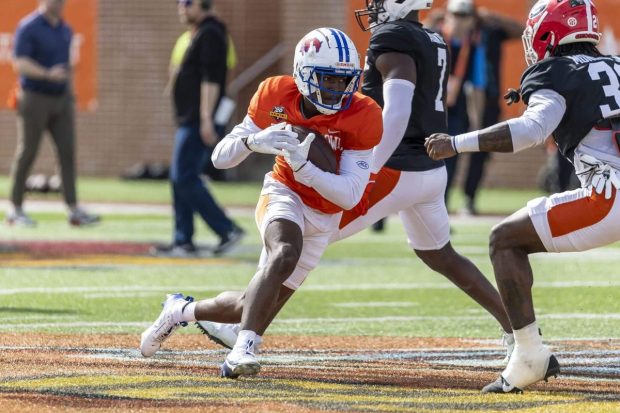
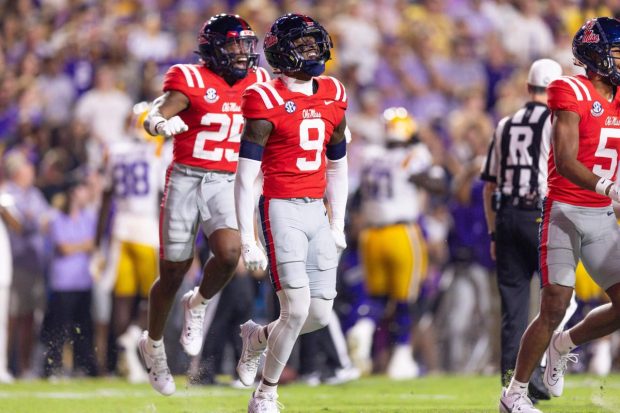
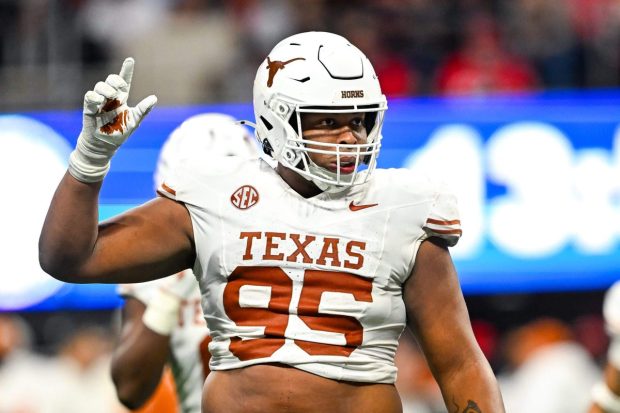
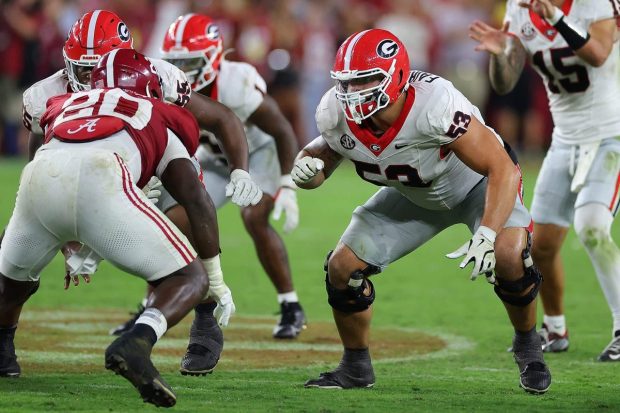
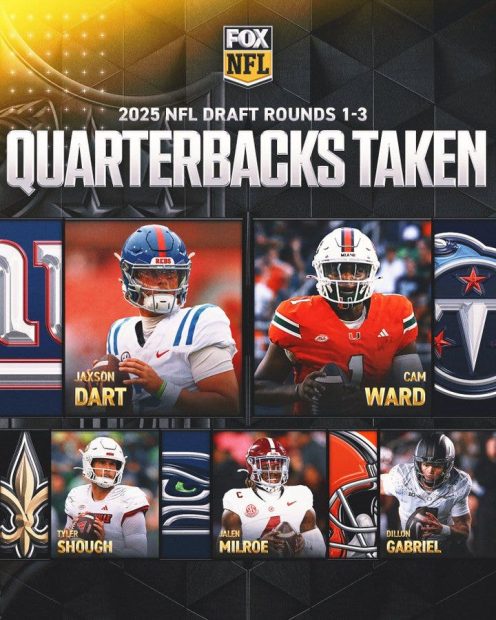
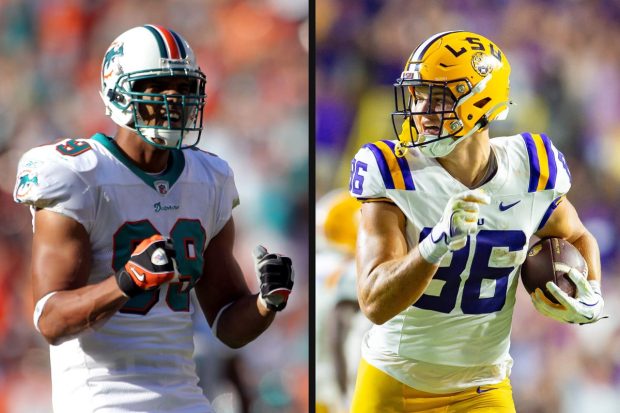
Be the first to leave a comment